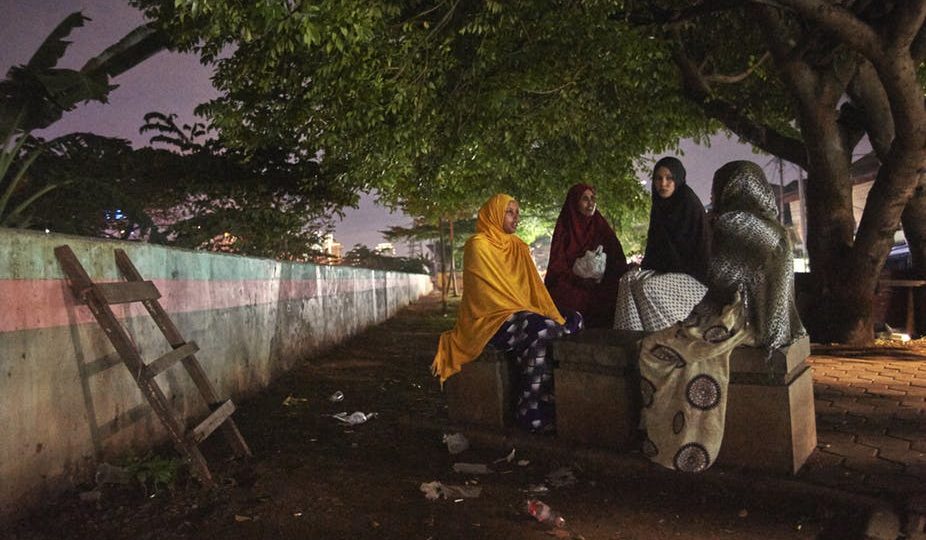By Anbar Jayadi, Universitas Indonesia
In March, a young refugee fleeing war-torn Afghanistan hanged himself in Medan, Indonesia.
The 22-year-old Hazara, an ethnic minority in Afghanistan, was not the only refugee in transit in Indonesia who has committed suicide this past year.
A group of refugee scholars reported that the office of the United Nations High Commissioner for Refugees (UNHCR) counted 14,337 asylum seekers and refugees in Indonesia in June 2017.
For refugees waiting to be resettled in a third country, they face a soul-crushing malady: idleness. They have nothing much to do other than waiting.
Indonesia is not a signatory to the 1951 Refugee Convention. The UNHCR provides support for refugees in Indonesia. But the support is limited. In June 2017, there were more than 5,700 asylum seekers and refugees who have to fend for themselves, without being able to earn any income.
Read more: Indonesian cities and regencies may be asked to shelter refugees – will they comply?
Early this month, the Australian Associated Press released a photo essay on the lives of Somali refugee women. Having escaped atrocities in their home country, they face hunger, poverty and homelessness in Indonesia.
In December 2016, Indonesia issued a regulation on how government agencies should handle refugees arriving in Indonesia. The presidential decree finally acknowledges that asylum seekers and refugees are people in need of protection.
But the regulation does not address the increasingly problematic situation in Indonesia. Asylum seekers and refugees are still excluded from Indonesia’s legal realm, resulting in them living in deprivation.
Excluded and without rights
The political philosopher Hannah Arendt introduced the concept “a right to have rights” in The Origins of Totalitarianism. She wrote that this right means “to live in a framework where one is judged by one’s actions and opinions.”
Legal philosopher Nanda Oudejans utilised Arendt’s concept in understanding the plight of refugees. Oudejans argues: “The refugee is not only without a world in the thorough political sense … also he is nowhere in the world in a legal sense.”
The suicide of Hayat, in my view, reflects the frustration of being excluded from Indonesia’s legal realm and, to some extent, Indonesia’s society.
A refugee is “excluded” in the sense that they cannot participate fully as a person in Indonesia’s public life. They cannot work and their voice is almost inaudible. I argue that the legal categorisation of “refugees” in Indonesian laws remain one of the sources of this frustration.
Solely analysing Indonesia’s situation might seem to neglect the global context of the issue of refugees. It is true that when we talk about third-country resettlement, other countries’ policies matters as well.
For example, the Trump administration policy limited the number of refugees to be admitted into the United States in the 2018 fiscal year to 45,000. This is below the average 75,000 admitted into the US in the past decade.
Australia has stopped resettling asylum seekers registering with the UNHCR in Indonesia after June 2014.
These policies reduce the availability of resettlement places for refugees in Indonesia. Not to mention, as the UNHCR Indonesia asserts, that the fairly small numbers of refugees in Indonesia in comparison to other countries of asylum has resulted in fewer places for resettlement for refugees waiting in Indonesia.
Nevertheless, I draw attention to Indonesia specifically because the situation is increasingly problematic. On one hand, the refugees in Indonesia face increased difficulty in being resettled in a third country as the chances are getting slimmer. On the other hand, the existing Indonesia laws are not yet accommodating the presence of refugees who are in the waiting period. As such, the refugees, though they are physically present in Indonesia’s territory, are “nowhere” in Indonesia’s political and legal space.
‘Refugees from abroad’
The 2016 presidential decree uses the term “refugees from abroad” and not simply refugees. The decree further define the refugees from abroad as “foreigners in Indonesian territory” who are here due to fear of persecution.
To describe refugees as foreigners is technically true. However, it is worth pondering that the language of a lot of regulation on refugees, including Indonesia’s 2016 presidential decree, reinforces the “alienness” of refugees. The regulation is set to make them remain “outside”.
Additionally, as refugee scholars Antje Missbach and Nicholas Feith Tan argue, the regulation does not really cover the protection of refugees in Indonesia. It is merely a procedure for handling refugees from abroad. The regulation is silent on what refugees can or cannot do while they wait to be resettled in a third country.
For the resettlement process itself, the UNHCR explains that it takes “a considerable amount of time” (i.e. it is “at least six months or longer”) to wait to be interviewed. And the wait for departure to a third country is even longer (up to “one year from acceptance but it can take longer”).
The UNHCR leaflet even highlights to refugees that “you may never be able to benefit from resettlement from Indonesia”. This leaves the refugees in a state of chronic uncertainty, which, in the case of Hayat, led to suicide.
Calling for Indonesia’s government response
In 2016, the Ministry of Law and Human Rights, through its regulation, formed a task force for monitoring foreigners in Indonesia, or TIM PORA.
As refugees are defined as “foreigners” according to Indonesia’s regulation, this task force should be handling refugees as well. So far, it mainly deals with foreigners violating visa rules.
TIM PORA can be the perfect fit to respond to the distress experienced by refugees in Indonesia as the task force is drawn from various state institutions and operates at both national and regional level. It should be able to reach out to refugees.
![]() It is time for Indonesia’s government to respond, without waiting for another Hayat.
It is time for Indonesia’s government to respond, without waiting for another Hayat.
Anbar Jayadi, Assistant Lecturer, Faculty of Law, Universitas Indonesia
This article was originally published on The Conversation. Read the original article.




